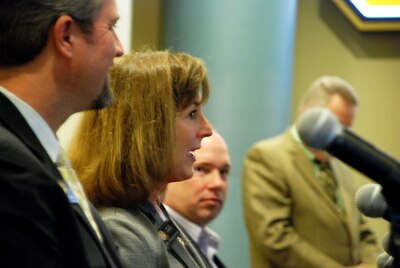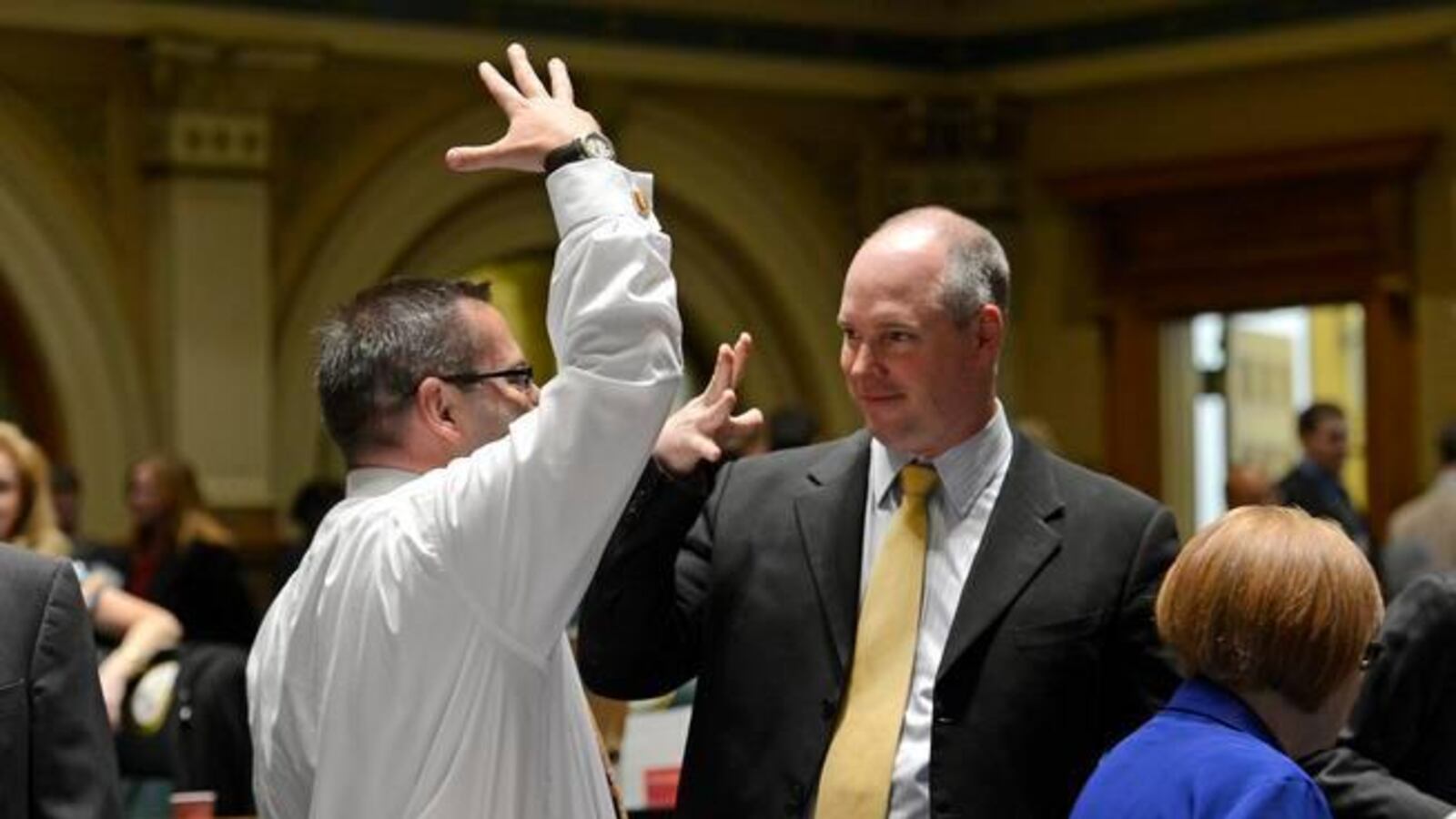As Colorado lawmakers return to the Capitol on Wednesday to begin crafting education policy and setting spending priorities, they face significant budget challenges, an uncertain transition in Washington and a growing chorus of educators fatigued by change.
The topics lawmakers are expected to address — including testing, school accountability and funding — are familiar. But the nation’s new education law, the Every Student Succeeds Act, and the likelihood the Trump administration will relax regulations in public education could provide lawmakers with new opportunities to rethink the state’s own education laws.
Still, how the state funds its schools is likely to take up the most oxygen, lawmakers and Capitol observers agree. Economic forecasts since June have shifted, creating a moving target for budget drafters. As of December, the economy was rosier — but classrooms still could see cuts because of Colorado’s complicated tax laws.
How the state’s education landscape looks four months from now when the legislature adjourns is anyone’s guess. In the past, the state has been recognized for both being on the forefront of education reform and for spending so little on students.
It’s been an epicenter in the debate over standardized tests, but avoided a showdown over academic standards that establish what students are expected to know at each grade level.
Lawmakers and observers agree that substantial changes this session are unlikely. But a foundation could be laid for bigger changes in 2018.
The status quo — at least for another year — would be welcomed by school leaders who have spent nearly a decade putting in place education reform efforts ranging from literacy requirements for young students to updated graduation guidelines.
“A year with fewer education bills would really be a great year,” said Diane Doney, Littleton Public Schools’ chief financial officer and president of the Colorado Association of School Executives. “But I would love to see the funding figured out.”
Here are seven storylines we’ll be watching this year based on more than a dozen interviews with lawmakers and Capitol observers:
State Reps. Bob Rankin and Millie Hamner want to transform the way the state funds its schools.
Last session, Rankin, a Carbondale Republican, and Hamner, a Democrat from Frisco, hosted several unofficial study sessions to discuss school finance. That work carried over through the summer in private conversations with a diverse group of lawmakers including state Reps. Brittany Pettersen, a Lakewood Democrat, and Jim Wilson, a Salida Republican, and state Sen. Owen Hill, a Colorado Springs Republican.
While they’re not quite ready to introduce legislation on opening day, two concepts are in play.
The first would be a bill, which has not been drafted yet, that would ask voters to reset a statewide tax rate, known as mills, on property. Currently, every county and school district taxes personal and business property at varying rates. Some school districts like Weld earn large sums from their local property taxes, while others like Fountain gain very little.

A combination of constitutional amendments and state statutes leave school districts powerless in setting their tax rate. The effect has been the portion of local tax dollars put toward school funding has shrunk and the state has had to increase its share in per pupil funding.
Rankin and Hamner have yet to decide what the new tax rate would be.
They face a difficult path. In an interview, Hamner said she wants the Joint Budget Committee to sponsor the bill that would refer the measure to the ballot. That would require unanimous support from all six members. If the budget committee agrees to sponsor the bill, it would need to win support from two-thirds of both chambers.
So far, neither Senate nor House leadership has given much thought to the proposal, which was first discussed at a Joint Budget Committee meeting in December.
Hamner and Rankin’s second concept would set up a committee and hire a third party to establish a new long-term vision for Colorado’s education system, including what modern classrooms should look like and how they should be paid for. Colorado currently funds its schools based on a formula written in the 1990s.
“The leadership has to come from the legislature,” Rankin said.
Rankin and Hamner are currently working with legislative legal services’ deputy director, Julie Pelegrin, who has helped draft most of the state’s education laws since the 1990s, on their bill. They’re also lobbying their peers to shore up support before they introduce anything.
“It’s very delicate,” Hamner said. “We want to make sure when we do introduce a bill, it has a lot of support from the very beginning, or else it could be destined for failure.”
It’s probably going to take a lot of creative accounting to keep cuts from schools.
Back in November, Gov. John Hickenlooper, a Democrat, proposed a slight increase in per pupil funding while still increasing the school funding shortfall, known as the negative factor, by about $46 million.
In December, the state learned that the economy was doing better than expected, it might have to issue refunds to taxpayers, and that the state was going to have to lower the personal property tax rate to meet a constitutionally required ratio with business property taxes.
Bottom line: lawmakers are going to have to make some very difficult decisions.
“I’m so depressed because of our situation,” Hamner said. “Unless we can reach some bipartisan agreement of how we think about the refunds, I think we’re going to have a really tough budget year.”
The biggest policy fight will likely be over charter school funding — though the outcome seems clear.
Hill, chairman of the Senate Education Committee, is ready to bring a proposal to require that local school districts share voter-approved tax increases with their charter schools.
While his proposal last year had bipartisan support in the Senate, House Democrats spiked it at a committee hearing.
With similarly split chambers this year, the same fate all but certainly awaits Hill’s bill.
Several lawmakers are ready to rethink ninth-grade testing. And they might have a way to convince the governor to support their plan.
Two years ago when lawmakers first took on revamping the state’s testing system, there was disagreement about whether to eliminate ninth-grade testing. But Hickenlooper insisted on keeping the tests and his veto power ensured they would remain.

Lawmakers are anxious to test whether might Hickenlooper might budge when pressed again.
One of the first education-related bills you can expect to see introduced will be from state Sen. Nancy Todd, D-Aurora. While the details are still being worked out, Todd’s bill would provide some flexibility around ninth-grade testing.
Currently, ninth graders are required to take the state’s PARCC English and math test. Todd’s bill would allow districts to choose between the PARCC test or administer an exam more aligned to a college entrance exam such as the SAT, which Colorado juniors will begin taking this year as their required test.
The nation’s new education law — and nominee for education secretary — are wild cards.
When lawmakers first heard about the Every Student Succeeds Act, the nation’s new federal law, they were gleeful. In their minds, Colorado would have full control of its own education system, with no interference from Washington.
Just over a year later, legislators aren’t so sure.
“I think part of what’s going on is that there is an effort to understand the freedoms that ESSA will give us, and the freedoms ESSA doesn’t give us,” said state Rep. Paul Lundeen, a Monument Republican.
Both parties are expressing caution.
“I think it’s important to take the opportunity to make our system better,” said Rep. Brittany Pettersen, a Democrat from Lakewood and chair of the House Education Committee. “But we have to do it responsibly — and that takes time.”
Just how long it will take lawmakers to start putting their ideas to paper is unclear. They’ll be taking some signals from new leadership in Washington. Next week, confirmation hearings will begin for President-elect Donald Trump’s pick for education secretary, Michigan billionaire and school choice advocate Betsy DeVos.
“I think we may see some big things,” said Lundeen, who plans on taking a very close look at the state’s accountability system. “There’s just not black letters on white paper yet.”
Is this the year rural schools get the flexibility they want? Rep. Jim Wilson hopes so.
One of the lawmakers who was most excited about the new federal education law was Rep. Jim Wilson, a Salida Republican. He’d hoped the new law would provide some relief for rural schools.
Wilson has regularly run bills trying to eliminate paperwork and provide flexibility for rural schools.
“If districts are doing well, why are they required to turn in the same reports with the same frequency?” he said, suggesting some schools shouldn’t have to file regular reports that track goals and progress.
Wilson and other Republicans also hope to make headway on the issue of teacher hiring. Teachers in Colorado are required to hold a license to teach. Some want to relax those rules for rural schools, where hiring a licensed teacher can be difficult.
“It’s always a battle,” Wilson said.
One possible logjam for rural flexibility is a proposal from the State Board of Education. The board hopes to find a sponsor to carry a bill that would put some limitations on waivers they grant. Currently, once the state grants a waiver from state law, the board cannot revoke it or review a school district’s progress. Members, at the least, want some sort of authority to check in on how the waivers are working in school districts.
The board has not found a sponsor for its proposed legislation.
Don’t expect too much help on the state’s teacher shortage.
Lawmakers on the state’s education committees are more than aware that the state is in a crunch. Colorado’s teacher prep programs aren’t producing enough teachers to replace the number of teachers retiring. That’s especially true for middle and high school math and science teachers. And rural schools are especially at risk of being short teachers.

Remedies are not quick to come, though.
There’s the usual talk about rewriting the state’s teacher evaluation law. The law requires teachers to be evaluated every year, and 50 percent of the evaluation must be based on students’ academic growth.
And some unfinished business on Hickenlooper’s agenda includes reforming the state’s teacher licensing process. For teachers to obtain a license, they must pass a series of tests. The law governing teacher licenses hasn’t been updated since the 1990s.
But whether there’s a compromise to be found between Hickenlooper and different camps of lawmakers — those supported by the state’s teachers union and those supported by education reform groups — is the big question.
Todd, the Democrat from Aurora, is a former teacher. She agrees that teacher prep programs need to be updated. But, she said, “My hope is that when we talk about teacher evaluations, quality of teachers, preparation of teachers, that all of those things are really strengthening the individual to go into the classroom and make them successful.”

